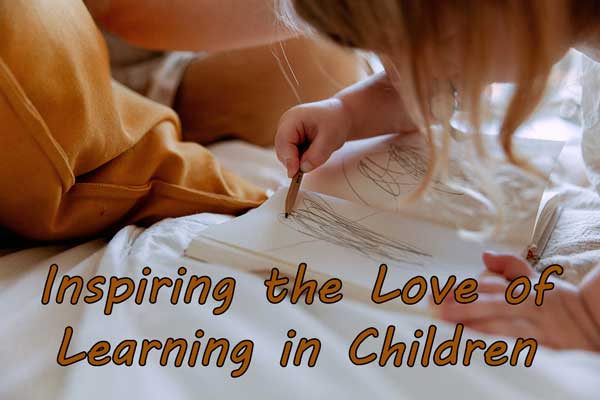It is nothing less than divine wisdom that the first word revealed in the Quran is “read.” Allah says, “Read in the name of your Lord who created, created man from a clinging substance. Read, and your Lord is most generous, who has taught by the pen, taught man what he did not know” (Qur’an 96:1-5).This very first revelation to Prophet Muhammad (s) conveys to us the importance of reading and writing, of learning and seeking knowledge. In fact, Allah created children with the innate desire to learn. Even before the first year, a child begins to observe and explore his or her environment. They are curious and even employ simple investigative learning techniques— they use all their senses to explore an object, touching it, putting it in their mouth to taste it, shaking it, pulling on it, etc. There is so much they want to experience, especially in the formative years. Unfortunately, this innate desire is often crushed by parental dismissal of the creative and explorative capacity in their children and then by schools that overly emphasize regimentation.
The Qur’an is resplendent in providing examples of learning through engaging with our environment,from the vast expanse of the galaxy to the depths of the oceans. Winds and clouds, what is within soil, the life-giving properties of water, the alternation of night and day, and so many more references to the world of nature — all are presented as being signs of Allah.The Qur’an encourages humans to engage in deep reflection and critical thinking. Aptly put, learning is a lifelong journey! As parents and teachers, it is our responsibility to encourage and provide the most appropriate learning circumstances and conditions to help our children achieve that “aha!” moment. This can be done through facilitating children to expand their inherent inquisitive nature. This also builds their confidence in themselves and encourages them to lead a more content and satisfying life.
So how do we take on this task?It isall up to us and our readiness to educate ourselves, engage in reflection and critical thinking ourselves, and make the needed efforts to enable our children to become lifelong learners and explorers! Below are strategies that can support you and your child in developing the love and passion for learning.
Strategies for Lifelong Learning
Reading together: There cannot be enough emphasis on the impact of reading to children, especially reading aloud. Apart from arousing and increasing their curiosity and stimulating their imagination, reading to children develops a sense of confidence and competence in them. Because of the intimacy involved in reading to children, it leaves a lifelong positive emotional impact and favorable attitude towards reading as the child grows up.Trips to libraries continue to infuse the desire to read in the child until he or she becomes an independent reader who loves to explore and learn.
Active listening: This communication skill, one that must be learned,will be so valuable in both the professional and personal life of the child as their life unfolds.Active listening requires the listener to fully concentrate, understand, and then respond to what was said. Itcan be beautifully incorporated into the reading program by asking higher order questions. Here are some examples of questions that can be asked when reading with young children:
- What was the problem in the story? Was it solved?
- What was the lesson in the story?
- How are you like the main character in the story?How are you different?
- Which character in the story would you choose for a friend?
- Did anything in the story surprise you?
The parent has the opportunity when the child answers each question to model active listening. And the child is practicing active listening when the parent asks questions about what they are reading. Active listening improves the child’s attention span and increases engagement,creating a space for the child to respond appropriately and in a timely manner.
Learning through play: As cliche as this phrase may seem in the world of progressive education, it is by far the most successful model in achieving the desire to learn.Playing helps children learn communication skills, develop their motor skills, and helps with problem solving,all great ingredients for a love relationship with learning.Unstructured play is a great tool to encourage children to learn how to engage with their environment and to learn independently. Researchers agree that play provides a strong foundation for intellectual growth, creativity, and problem solving— the perfect combination for cultivating a habit of lifelong learning.
Connecting with nature: Children spend more time viewing television and playing video games on computers than they do being physically active outside. Day-to-day life, for too many young children, is a blur of color, movement, and blaring sounds on screens. Add processed food that is high in calories and sugar to the sedentary aspect of sitting in front of screens and children are being set up for counter-productive habits and ill health as they get older.
Spending a lot of time in the natural world is healthy. Viewing the natural landscape during walks,feeling the wind, enjoying the warmth of the sun, stargazing — these experiences in nature are not only healthy for the child, it is an opportunity to discuss on a simple level how all these elements are signs of Allah, meant to inspire us to think and reflect about the creation and increase our faith.Immersing the child in nature so that it becomes a positive habit is also a way to build resilience to stress. Studies show that direct access to nature can improve physical, mental, emotional, and spiritual health.
Exercising the mind, body, and soul: The body needs lots of exercise and for small children, this can be as simple as playing outside. And just as our bodies need exercise to thrive, our mental and cognitive faculties are like a muscle and need to be exercised. Simple games such as alternately cross-tapping the knees with the hands or putting together puzzles are a great starting place.Games for the brain are things like a face memory game, a spot-the-difference game, a match-up card game, etc. Whether store-bought or home-made,these sharpen cognitive skills, build memory and quick thinking, increase vocabulary, build the child’s capacity to reason, plan, visualize, focus, and pay attention.
The soul also needs to be nourished to remain pure and devoted to Allah. Establishing salah and adhering to all the pillars of Islam and the articles of faith are definite enhancers in fueling and cultivating the love of Learning.
Implementing organization and structure: Last but not least is discipline. Helping children develop and foster their own self-discipline is so important. Allah created the night and day,giving an outward structure to our daily lives. Then He provided us with the five pillars of the religion and, without doubt, prayer, fasting, and charity all facilitate a disciplined approach to life. These give us benchmarks of faith and regular habits of living and worshipping.
Providing structure for children and setting up routines for daily living that are consistent and predictable are important.Setting limits and boundaries for children helps create a balance and gives them a sense of security and stability. It also makes them feel in control of their environment which is key in the development of self-confidence.A lack of structure, even for young children, can lead to a haphazard existence, void of motivation, goal-setting, or striving for excellence. This is a path to low self-esteem and a stunted sense of possibility for achievement.Organization and structure must be part of the daily life schedule. An ideal sleep-wake cycle that includes seven to eight hours of sleep, monitoring and controlling screen times,regular family mealtimes, as well as some basic daily chores—all have a lasting impact on the overall well-being of the growing child.
To conclude, the parent is the most important influencer in infusing the love of learning in children.Role modeling, including the way you yourself are disciplined,organized, and demonstrating a love of learning,has a strong and lasting effect on how deeply children fall in love with the seeking of knowledge.An expert in early childhood education once said, “You have to love to learn in order to be able to teach children to love learning.” So true.






